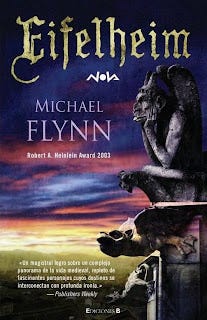The I Might Believe in Faeries Bookclub discussion of Michael Flynn’s Eifelheim will take place this Friday on May 10, 2024 at 08:45 pm Central Time.
In this post you will find the following:
Several potential discussion questions
The Link to the Google Meets meeting
Michael Flynn’s essay “Discovering Eifelheim”
The last two points will be behind a paywall. I wanted to share my discussion questions with anyone who may have read the book, but is not a paid subscriber. These questions are only meant to help facilitate the discussion on Friday and other bookclub members might have their own points and questions they want to bring up.
If you really want to read Flynn’s essay, then it can be found in the book Medieval Science Fiction published it 2016 by King’s College London Centre for Late Antique & Medieval Studies. The editors were Carl Kears and James Paz. I got a copy through interlibrary loan, which has helped me tremendously in the past as well.
Without further delay, here are my discussion questions in no particular order. I tried not to write spoiler heavy questions, but read at your own risk anyway. I might come up with more as the meeting draws closer:
What Saints are significant in Eifelheim? Are there any in the background of the story and how do they influence the plot? (I am thinking here of St. Laurence and St. Catherine).
How do you think modern people would react to alien contact? Is this a real possibility?
How does Flynn track time in the Middle Ages and how does that compare to the modern sections of the book?
Compare the Krenken to the monsters on the outside of the Church of St. Catherine. Is there a parallel between them? What purpose do the monsters outside the Church walls serve and do the Krenken serve the same purpose?
The Krenken misunderstand a lot about Christianity because they interpret the concepts through their own framework. Based on this, do you think the Krenken converts genuinely understood Christianity and how would we know this?
How does the science of Aristotle compare with Krenkish science? Are there any similarities?
Was Arnold’s sacrifice moral?
In Flynn’s essay, “Discovering Eifelheim”, he wrote that it was harder to accurately depict the medieval people than it was to depict the aliens. Why do you think that was the case?
I believe that there are two distinct endings in Eifelheim. How does the ending of Dietrich’s story compare with that of Tom, Sharon, and Judy? Hopeful? Despairing? Transcendence vs space travel?
Keep reading with a 7-day free trial
Subscribe to I Might Believe in Faeries to keep reading this post and get 7 days of free access to the full post archives.




